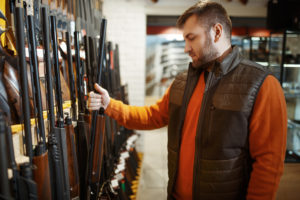
Federal law and most state laws prohibit you from owning, possessing, or purchasing firearms following a felony conviction. Then if you are caught with a gun, you face charges for another crime often referred to as “felon with a firearm.”
Note, however, that if you are convicted of a felony and remain otherwise law-abiding, you may eventually be able to restore your gun rights by:
- getting your conviction expunged,
- getting the felony reduced to a misdemeanor,
- petitioning the court for restoration, and/or
- obtaining a pardon.
A few states say that your gun rights are automatically restored after a certain amount of time has elapsed from your conviction (for example 10 years).1
1. Can you have a firearm after being convicted of a felony?
The gun laws/firearm laws of most states say usually no. You will generally face criminal charges if you own a firearm, or have possession or control of one, after receiving a felony conviction.2
Most states charge this offense as a felony.3 Further, the offense often works to impose a lifetime ban on owning a gun.
A “firearm” is generally defined as an object used in the propulsion of shot, shell, or bullets by the action of gunpowder exploded inside it.4
Firearms can include:
- handguns,
- rifles, and
- assault weapons.
2. Can you restore your firearm rights?
It depends on the facts of your case and the state in which you received your conviction.
Some states allow a convicted felon to restore his/her gun rights after a felony by:
- filing for an expungement,
- having the felony reduced to a misdemeanor,
- asking for a court order for restoration, and/or
- obtaining a pardon.5
A “pardon” is an action that sets aside the punishment for a crime. State governors generally have the power to pardon non-federal crimes, while the President carries the power to pardon federal offenses.6
You often initiate the pardon process by filing for a Certificate of Rehabilitation.
Note that a few states say that you really do not have to take any action to restore your gun rights. Rather, your rights are restored after a certain amount of time elapses from the date of your felony conviction.7
3. Can you lose firearm possession for misdemeanor convictions?
Some misdemeanor convictions can result in the loss of your civil rights to own or possess a gun.
For example, many misdemeanor domestic violence convictions will result in the loss of your gun rights.8
Note also that some states say that you have to surrender your gun rights if you have a
- restraining order or
- protective order against you.9
Further, a judge may punish misdemeanor offenses by placing you on probation. The judge does have the authority to make one of the conditions of probation to involve no possession of a firearm until you have completed probation.
4. What are common defenses to a “felon with a firearm” charge?
From my decades of experience fighting these charges, I have had great success in getting “felon with a firearm” charges dismissed by arguing either:
- The police found the gun through an unlawful search, and the court should therefore suppress it as evidence.
- You were genuinely unaware of the firearm’s presence or did not have actual or constructive possession of it.
- Someone else possessed the gun, and you were the victim of mistaken identity.
- Someone falsely accused you of gun possession to get you into trouble.
- You or someone else was facing an immediate risk of death or severe bodily injury, so you were justified in using the gun in self-defense or defense of others.
5. Can a criminal defense attorney help?
Yes. It is important to consult with a criminal defense attorney if you have been convicted of a crime.
If you are facing felony charges, a defense attorney or law firm can try to get the charges reduced so that you will not face the possibility of losing your gun rights.
A lawyer can also help you challenge a charge with a legal defense (for example, maybe law enforcement or a police officer arrested you without probable cause).
If you are convicted of a felony, a defense lawyer can review your criminal record/criminal history to see if you might be able to restore your gun rights.
Please keep in mind that most attorneys and law offices provide free consultations. This means you can get legal advice without spending a dime.
Note as well that your communications with an attorney are protected by the attorney-client relationship. According to this bond, your lawyer cannot disclose your confidences without your prior consent.
Legal References:
- Minn. Stat. 609.165(1)(a).
- Florida Statutes 790.23. See also 18 U.S.C. 922(g).
- See same. See also California law, California Penal Code 29800 PC.
- Black’s Law Dictionary, Sixth Edition – “Firearm.”
- See, for example, Colorado House Bill 14-1230. See also Nevada Revised Statutes 213.090.
- Black’s Law Dictionary, Sixth Edition – “Pardon.”
- See, for example, Louisiana Revised Statute 14:95.1(c)(1) and Minnesota Statutes 609.165(1)(a).
- See the Department of Justice website.
- See, for example, Revised Code of Washington 9.41.801.

